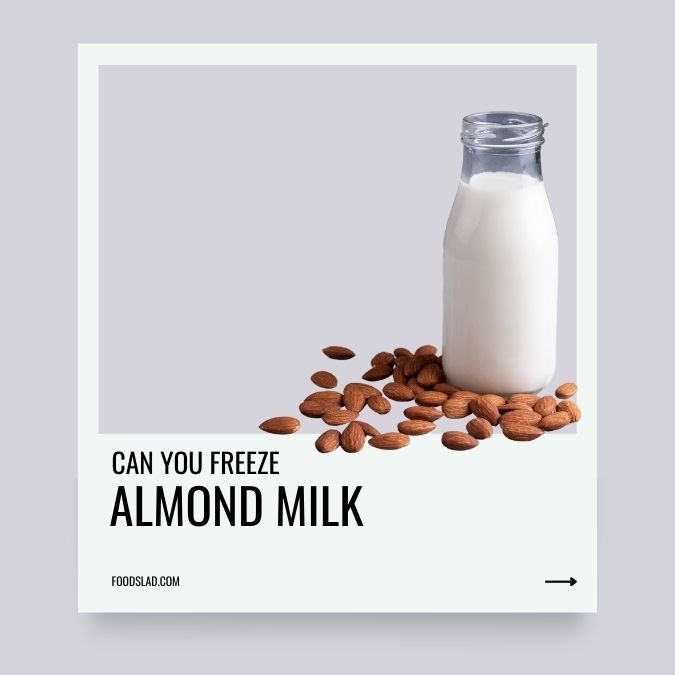Have you ever found yourself with too much almond milk and wondered if you could freeze it to save it for later? Almond milk is a popular dairy alternative that many people use in their daily routines. It is delicious, nutritious, and a great substitute for cow’s milk. However, not everyone consumes almond milk at the same rate, and sometimes it can be challenging to use it all before it goes bad. In this article, we will answer the most common questions which is Can You Freeze Almond Milk?

Can you freeze almond milk –
Before diving into the main topic let’s find out what is almond milk –
Almond milk is a dairy-free milk alternative that is made from ground almonds and water. It is a nutritious alternative to cow’s milk and is low in calories, lactose-free, and vegan-friendly. Almond milk has a nutty flavor and can be used in many recipes, from smoothies to baked goods.
Yes, you can freeze almond milk. Freezing almond milk is a great way to extend its shelf life and prevent waste. It is a simple process, and the almond milk can be frozen in its original packaging or in an airtight container. However, some people wonder if freezing almond milk will change its taste or texture.
Does almond milk curdle when frozen?
Almond milk can curdle when frozen, but this is not always true. The texture of the almond milk may change, but this does not necessarily mean it has gone bad. When almond milk is frozen, the water content in the milk expands, which can cause separation. As a result, the almond solids can separate from the water and create a grainy texture. However, this does not affect the safety of almond milk, and it can still be consumed.
How long can you freeze almond milk?
You can freeze almond milk for up to six months. The almond milk should be stored in an airtight container or in its original packaging to prevent freezer burn. Freezer burn can affect the taste and texture of almond milk, and it can also lead to the growth of bacteria.
Can you freeze silk almond milk?
Yes, you can freeze Silk almond milk. Silk almond milk is a popular brand of almond milk, and it can be frozen the same way as homemade almond milk. You can freeze Silk almond milk in its original packaging or in an airtight container. Just make sure to shake the almond milk well before using it to ensure that the texture is consistent.
Can you freeze homemade almond milk?
Yes, you can freeze homemade almond milk. Homemade almond milk is a great way to control the ingredients and the sweetness level of the milk. It is also a more cost-effective option than store-bought almond milk. When freezing homemade almond milk, it is recommended to use a glass container or a freezer-safe plastic container.
How to freeze almond milk?
To almond milk freeze, follow these simple steps –
- Shake the almond milk well to ensure that it is well-mixed.
- Pour the almond milk into an airtight container or its original packaging.
- Leave about an inch of the area at the top of the container to permit expansion.
- Label the container with the date of freezing.
- Place the container in the freezer and freeze for up to six months.
Why not freeze almond milk?
While almond milk can be frozen, there are some downsides to consider. As mentioned earlier, the texture of the almond milk can change, and it can separate when thawed. This may affect the taste and texture of the almond milk, making it less desirable to drink on its own.
Additionally, freezing almond milk may also cause the milk to lose some of its nutritional value. This is because freezing can damage some of the nutrients in the milk, particularly vitamin E, which is an antioxidant that helps protect cells from damage.
Another thing to consider is that freezing almond milk can take up a significant amount of freezer space. If you have a small freezer, it may not be practical to freeze almond milk, especially if you don’t use it often.
Finally, if you plan to use almond milk in a recipe that requires a smooth and consistent texture, it may not be ideal to use previously frozen almond milk, as it may not blend well with other ingredients.
How to thaw frozen almond milk?
Thawing frozen almond milk is easy. Simply remove the container from the freezer and place it in the refrigerator to thaw overnight. Once thawed, shake the almond milk well before using it. Avoid thawing almond milk at room temperature or in the microwave, as this can cause the milk to separate and lose its texture.
Conclusion –
Freezing almond milk is a great way to extend its shelf life and prevent waste. While freezing may change the texture and taste of the milk, it is still safe to consume and can be used in recipes that require a consistent texture. It is recommended to freeze almond milk for up to six months and to store it in an airtight container or its original packaging. Finally, when thawing frozen almond milk, make sure to do so slowly in the refrigerator and shake the milk well before using it.
Frequently Asked Questions (FAQs) –
Q: Why would someone freeze almond milk?
A: Freezing almond milk is a great way to extend its shelf life and ensure that it doesn’t go to waste. It is also a convenient way to have almond milk on hand for smoothies or recipes that call for it.
Q: Can frozen almond milk be used in recipes?
A: Yes, frozen almond milk can be used in recipes that call for almond milk. It may change the texture of the recipe slightly, but it should not affect the taste.
Q: How long can you freeze almond milk?
A: Almond milk can be frozen for up to 6 months. After that, the quality and taste may start to decline.
Q: How should almond milk be stored in the freezer?
A: Almond milk should be stored in an airtight container, leaving some space at the top for it to expand as it freezes. It is best to freeze in small portions, such as ice cube trays or small freezer bags, to make it easier to thaw only what you need.
Q: How should frozen almond milk be thawed?
A: Almond milk can be thawed in the refrigerator overnight or at room temperature for a few hours. It can also be thawed in the microwave on a low setting, but it is important to stir it frequently to prevent hot spots. Once thawed, almond milk should be consumed within 7-10 days and not refrozen.

